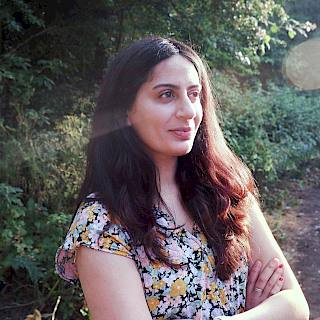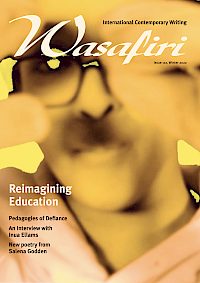Writing Myself Down: The Language of Autofiction by Durre Shahwar
In this profound essay in fragments, Wasafiri's Writer-in-Residence Durre Shahwar explores the slipperiness of language, and the 'missed connections within or due to language'; learning Urdu, and how the 'hand movement of writing Urdu is akin to drawing'; and translation: how in the end she, too, 'become[s] the thing to be translated'. Don't miss Durre Shahwar’s final workshop, Autofiction: Bearing Witness, which will take place live in partnership with Dyddiau Du, Cardiff, Wales on 15 April 2023.
Sentences
I’m reading a book. A freshly printed hardback, celebrated as the epitome of writing, the kind that wins prizes and I see a missing word. A missing conjunction that would have connected the nouns, adjectives, and adverbs and made the sentence complete. I read and re-read the sentence, adding in the word that I think would complete the sentence, while trying to hold space for the other words that the author may have wanted to use. At one point, I wonder if how the sentence stands now is exactly what the author intended, and whether it is my own lack of grasp on language – language that has surely been perfected and shaped by editors and proofreaders – that is falling short.
Some would call this a matter of self-believe and conviction, or in this case, a lack thereof. The same lack that we often call writer’s block or imposter syndrome. The fear that perhaps our words, our arrangement of language and storytelling isn’t convincing enough, isn’t intricately-placed enough. That it will be caught out and picked apart. But I find comfort in the missing conjunction. It reminds me of the imperfect nature of writing.
Yet still I can’t help but think of the author’s experience. Was it fully communicated to us if the sentence wasn’t whole? The gap, the space between the words bothers me for weeks to come, and I begin to think of missed connections within or due to language.
Takhti تختی
When I was a little girl, my mother would write Urdu alphabets onto a takhti تختی in pencil for me to draw over to help me learn the alphabet and perfect my writing. My takhti was a wooden tablet that I could write on with ink and bamboo reed, wash, and reuse. In Wales, similar writing tablets made from slate were used in the nineteenth century. I can just about remember the satisfying scratching sound the bamboo nib dipped in black ink would make as I would glide it across the board. The wooden scent that accompanied the drawing, as though the earth itself was rising to embrace me while I’d focus for hours on the calligraphy in from of me, before proudly showing my mother the finished piece of art.
The hand movement of writing Urdu is akin to drawing. The letters, which stand alone in the alphabet, transform, seep and twine into one another to create a whole word. ر can flow like a waterfall, while ھ knots meaning together. The shapes shrink and stretch depending on the word. Urdu has a ten-vowel system composed of three lax and seven tense vowels. And just like the stroke of a brush that falls heavier on certain parts of the canvas and lighter on others, Urdu trains the tongue to do the same, slackening and tensing with the flow of sound and breath.
Memories
There were words I was never taught in Urdu because it was expected that I would have no use of them. This is despite the fact that I was reading Urdu newspapers at the age of four, and my older siblings’ Urdu novels at the age of seven. My mother never fails to remind me of this, which is also a memory that we both have. But we remember the same memory differently; hers contains feelings of pride and mine contains only the hunger to read and consume more words. My memory is also filled with the gaps that are often found in childhood memories. Our memories, although separate and subjective, are still tied together by this shared experience. By this fact.
And yet still, even with my eagerness to read, I am missing vocabulary. I think of this as the nurse douses my cervix with vinegar and looks at the screen in front of her for abnormalities. I have no language to speak to my mother about my body because I was never taught that language. I have never heard it speak despite being one of three daughters. It is this that stops me from telling her what is worrying me about ‘down there’, which is one way I would refer to it as a child. My mother taught me to write alphabets in multiple languages, but did not teach me every word to speak my experience into existence.
Phrases
Phrases swirl in my head when I’m most anxious. When younger, I would call these thoughts the thoughts of baboons, because it felt like they belonged not to me. Sitting on my bedroom floor, I would bury my head in the pillow, listening until the thoughts had passed. It was an intrusion of language, of voices, hurtling through my brain like trains on multiple platforms. Nowadays, I see it as a side effect of over-consumption. This language that I am overwhelmed by when my anxiety is at its worst, that leads me to believe in things that may or may not be. Language that I am also afraid to lose when away from a book too long, or when anti-anxiety medication subdues my thoughts and leaves my mind blank and empty.
This cacophony of language is also a loss of language: I become unable to think in it. A loss of thought. For as long as I can remember, I have stayed awake at night because it is the only time that I can come close to complete silence and stillness in a city.
Grammar of Animacy – Robin Wall Kimmerer
We often mistake nature as offering us this silence and stillness. Nature isn’t silent nor still nor apart from us. Its quiet, slow, and well-intentioned hum, the communion of leaves, twigs, soil, and the earth, surrounds us. A murmur.
My friend Leonardo Couto tells me about a photographer, Rinko Kawauchi, who describes her work as ‘in sympathy with small things in the bigness of nature’. I’m drawn to Leonardo’s own work: a photograph of a girl with her back turned to us looking intently at the sky; a small pair of glowing eyes peering out of forest in the night; white flecks of snow against an inky black sky. The photographs move without moving, capturing the dance between everything that is alive.
Translation
Different languages are different perspectives on our shared world, formed by our experience of it. It is impossible and limiting to mirror word-for-word. The gaps, the spaces that can’t be filled by literal translation are bridged by a spiderweb, network of language and associations.
‘The original’ is a point of departure, a point of origin, from which we undertake a journey and arrive at a new place. My mother tongue, Urdu, was my point of departure as was the country I was born in. Language travels, it always has, somatically and through vibrations of energy around us and across the world in 0.00001 millisecond depending on your browser speed.
So I write what I can remember and resurface language and words that I may forget if I didn’t put them down. And through this, I also become the thing to be translated. The person, the body, trying to cross the boundaries between one language and the life it carries, into another. It would be limiting to say I get half way, or make it across. In many ways I do. But it is more that I arrive into a space of my own. A space in itself.
Attend Durre Shahwar’s final workshop, Autofiction: Bearing Witness, which will take place live in partnership with Dyddiau Du, Cardiff, Wales on 15 April 2023.
Read her story, ‘The Golden Books’, first published in Wasafiri 112: Reimagining Education, which is available to purchase in the Wasafiri shop. Feature Photo Credit: Leonardo Couto
Edited by Darren Chetty, Angelique Golding, and Nicola Rollock, Wasafiri 112: Reimagining Education considers what education means within and beyond the classroom, investigating government intervention and the reclamation and exploration of decolonisation, and addressing the forces of change and continuity in Britain today.


